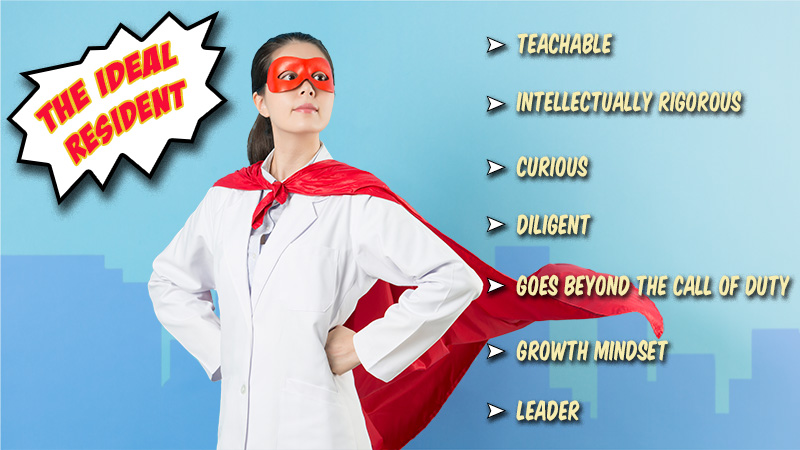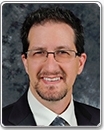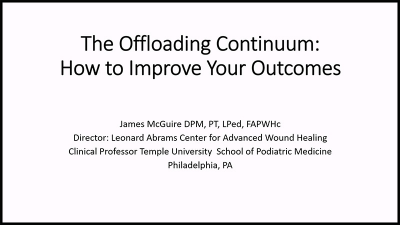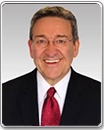
Practice Perfect 842
I Want a Resident Who…
I Want a Resident Who…

For those of you following our miniseries about studying Practice Perfect 840 - There IS a Correct Way to Study Part 1: Fundamentals First and Practice Perfect 841 - There IS a Correct Way to Study Part 2: How NOT to Study and are anxiously awaiting the final installment containing the correct, best and most optimal way to maximize your study time, don’t fret. It’s coming. However, the residency interviews in Texas are only a few weeks away. So, I wanted to address the single most common question I receive as a program director. During the residency interviews, I always leave time to allow our applicants to ask us questions. The hands down most common question I receive is, “What do you want in a resident?” At the risk of tipping my hand for the upcoming interviews, I will answer this question. I will also hazard a guess that at least some residency program directors will have a similar answer to this question. Now, you might say that anyone reading this will have the answer, and if they ask this question in an interview, will already know the answer. However, anyone who does not read this and is applying to a program that I run has clearly made a mistake in their lack of preparation.
So, let's get to it. What do I want in a resident? I want a resident who...
... is teachable. Simply put, a teachable resident is someone who will learn from all aspects of their experience. This entails several different things, but, at a basic level, is someone who will take advantage of all aspects of their education and make themselves the best physician they can be. When an attending tells you to go home and practice suturing, then the good resident will do it until they become an expert.
... is curious. What teacher does not want a student who is curious about the world around them and wants to learn more? Try to find a topic about which I know everything, and I will bet you will never find one. There is so much to learn about the world and every detail of our practice of podiatric medicine and surgery that only a curious person will be willing to learn as much as possible, knowing they will never know everything. I want that person.
... is diligent. I want a resident who is willing to come in early and stay late to receive the most education possible. This means taking more calls, doing more surgeries, staying late for clinic, taking the time to educate other students and residents, knowing that teaching someone else is a way for you to learn. I want the resident who reviews charts before the next clinic day and the one who is completely prepared for all aspects of surgery before the case starts. This level of diligence is superior. I have found it interesting that when I changed the structure of my residency program to include a larger amount of traveling to obtain the best possible education, including high volumes of surgical cases, strong clinical rotations, and rigorous academics, that the numbers of applicants declined. Maybe this is a good thing. Why do I want residents who are not willing to be diligent and take maximum advantage of all their opportunities?
... goes beyond the call of duty. I want someone willing to help everyone else without worrying about receiving praise. They are part of a team for the sake of being part of that team and making that team as good as possible. Sometimes, that means someone else gets the praise. As a student, did you go out of your way to help those in the classes below you? Did you help someone learn how to suture better or understand a certain type of pathology more than they might have? Did you do what you could to make others better than they might have been? Do you ask for more work to get the job done?
... is intellectually rigorous. I want a resident who will listen carefully to what I and their attendings say when we are teaching but not for the purpose of believing everything we say because we are the experts, but rather confirming that what we teach is true because that is the only way to learn. That means going to the literature and reviewing topics until they are complete and having a deep understanding of their chosen profession. It also means not believing everything you hear but always trying to confirm the truth. I want someone who can cite the literature, understanding its strengths and weaknesses and knowing what evidence is important and what should be discarded. This model resident would reach out to his or her attendings and discuss these topics without being prompted.
... has a growth mindset. Basically, this means they understand that their abilities are born from effort and correcting mistakes rather than skill being an ingrained part of their personality. The reason this is important is twofold. First, learning to become a good physician and surgeon is a difficult task, and it is made more difficult when we place our emotional baggage on top of it. “I am not good enough to be here” is not productive when learning to be a surgeon. I do not want someone with whom I must hold their hand to get them through learning to be a doctor and artificially elevate their self-esteem. I'd rather focus on the details of becoming a physician and surgeon. Second, having a growth mindset means focusing on our mistakes and areas of deficiency. We learn nothing when we focus on our strengths. It is helpful to maintain our strengths, but it is more effective to viciously target our deficiencies, fix them, and move on to the next one. This is the only way to attain mastery.
... is a leader. I am attracted to people who have the confidence and desire to do more, including leading others. It's amazing how much we learn when we are leaders. Great leaders also look for other leaders from which to learn. A good leader does not wait to be told what to do but rather seeks out opportunities. It is frustrating for any teacher when they have learners who want to be spoon fed. A leader will move beyond this state and be ready, willing, and able to lead themselves and others to bigger and better things.
I’d like to point out that there are two characteristics I did not mention: grades and hand skills. A knowledge of the academic material is important, yes, but it doesn’t correlate with the best doctors. Similarly, most surgery can be taught to a level of mastery whether the person has “great hands” or not. Attitudinal characteristics really make for the best residents. A “super smart” resident with “great surgical skills” is usually not due to some ingrained, fixed superiority but rather hard work and focus during their schooling that brought them to that level.
Residency applicants, for those of you reading this and thinking school is over and you’re going to float through residency and then get a great job, you are mistaken. Whether they say it or not, most residency program directors want residents with these characteristics. They may not believe this as intensely as I do, but they believe it, nonetheless. Residency is the start of a very rapid learning curve in becoming a podiatric foot and ankle physician and surgeon, and the three years of residency is actually very short. As such, directors really want someone who has the right attitude, is not lazy, can be taught to be excellent physicians, and have a strong internal drive to be the best physician they can be. If you're that resident, then I want you!
Best wishes and good luck at your interviews.

Jarrod Shapiro, DPM
PRESENT Practice Perfect Editor
[email protected]

































Comments
There are 0 comments for this article